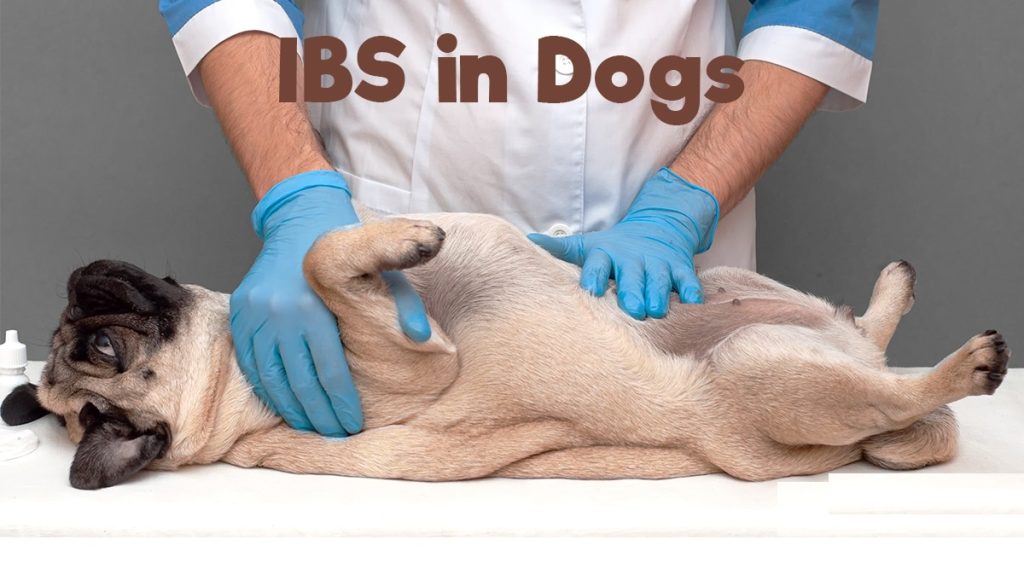Dogs can suffer from this frustrating and sometimes painful condition. Symptoms of lbs in dogs include diarrhea, constipation, gas, bloating, and abdominal pain.
If your dog is exhibiting any of these symptoms, it’s important to take them to the vet for a diagnosis. There are many possible causes of IBS in dogs, so your vet will need to rule out other possibilities before making a diagnosis.
Once lbs has been diagnosed, there are several things you can do to help ease your dog’s symptoms. With the right treatment plan, most dogs with IBS can lead happy and healthy lives!

What are the Signs of IBS in Dogs?
There are many different signs of IBS in dogs, and it can be tricky to figure out which ones are associated with the condition. Some common signs include:
Diarrhea: This is often the most noticeable sign of IBS in dogs. Diarrhea can range from mild to severe and may be intermittent or chronic.
Vomiting: Dogs with IBS may vomit more frequently than normal, or they may have episodes of “projectile vomiting” where they expel a large amount of vomit suddenly.
Weight loss: Because IBS can cause decreased appetite and malabsorption of nutrients, dogs with the condition may lose weight despite eating normally.
Abdominal pain: Many dogs with IBS experience abdominal pain or discomfort, which may be worse after eating or during periods of stress.
How Do Vets Diagnose IBS in Dogs?
Vets diagnose IBS in dogs by taking a complete medical history and performing a physical examination. They may also recommend additional testing, such as blood work, x-rays, or an abdominal ultrasound.
Once IBS is diagnosed, treatment typically involves dietary changes and medications to relieve symptoms.
What Triggers Inflammatory Bowel Disease in Dogs?
Many different things can trigger inflammatory bowel disease (IBD) in dogs. Some of the most common triggers include:
Infections: Dogs with IBD are often infected with various types of bacteria, viruses, or parasites. These infections can cause inflammation in the gastrointestinal tract, which leads to IBD.
Allergies: Food allergies are a common trigger for IBD in dogs. Allergic reactions to certain proteins in food can cause inflammation in the gut, leading to IBD.
Genetics: Some dogs are simply more prone to developing IBD due to genetics. If your dog has a family history of IBD, he or she is more likely to develop the condition.
Irritable Bowel Syndrome in Dogs Treatment
If your dog has been diagnosed with irritable bowel syndrome (IBS), don’t despair! There are treatments available that can help relieve your dog’s symptoms and improve their quality of life.
The first step in treating lbs is to identify and remove any potential triggers. This may involve changing your dog’s diet to a hypoallergenic or limited-ingredient diet.
If food allergies are suspected, your vet may recommend doing an allergy test. Once the trigger(s) have been identified, you can work on eliminating them from your dog’s environment.
Medication may be necessary to control IBS symptoms. Anti-inflammatories can help reduce inflammation in the gut, while antispasmodics can help relieve abdominal pain and cramping.
Probiotics may also be recommended to restore balance in the digestive system. With proper treatment, most dogs with IBS can live normal, happy lives!
What Can I Feed My Dog With Irritable Bowel Syndrome?
If your dog has irritable bowel syndrome (IBS), you may be wondering what the best food options are. IBS is a digestive disorder that can cause abdominal pain, diarrhea, and constipation.
While there is no cure for IBS, there are ways to manage the symptoms. One of the most important things you can do is to feed your dog a diet that is easy on their stomach.
There are a few different types of food that are generally considered to be good for dogs with IBS. These include:
- White rice
- Oatmeal
- Plain pasta
Dog Ibs Symptoms
Dog Ibs Symptoms Irritable bowel syndrome (IBS) is a common digestive disorder that affects dogs. The condition can cause abdominal pain, bloating, diarrhea, and constipation.
While there is no cure for IBS, there are ways to manage the symptoms and help your dog feel more comfortable. If your dog is exhibiting any of the following symptoms, they may be suffering from IBS:
Abdominal Pain or Discomfort
This is often the most noticeable symptom of IBS in dogs. Your dog may cry or whine when their abdomen is touched or when they try to defecate. They may also arch their back or adopt a hunched stance.
Bloating
A bloated stomach is often one of the first signs of IBS in dogs. You may notice that your dog’s abdomen looks swollen or distended. Their tummy may also feel hard to the touch. Bloating can be uncomfortable for your dog and may make them feel full even if they haven’t eaten much food.
Diarrhea
Diarrhea is another common symptom of IBS in dogs. The stool may be watery, soft, or runny and may contain mucus or blood. Diarrhea can lead to dehydration so it’s important to keep an eye on your dog’s water intake if they are experiencing this symptom.
Constipation
Some dogs with IBS suffer from constipation instead of diarrhea. The stool may be hard and dry and your dog may strain to defecate. Constipation can also cause abdominal pain and bloating so it’s important to get your dog checked out by a veterinarian if they are having trouble going to the bathroom.
Conclusion
Yes, dogs can get IBS, just like humans. The symptoms are the same: abdominal pain, diarrhea, and constipation. The causes are also similar: stress, diet, and other gut issues.
If your dog has IBS, there are a few things you can do to help them feel better. First, try to reduce their stress levels as much as possible.
This may mean giving them more exercise or attention or changing their diet. You should also talk to your vet about medications that can help with IBS symptoms in dogs.